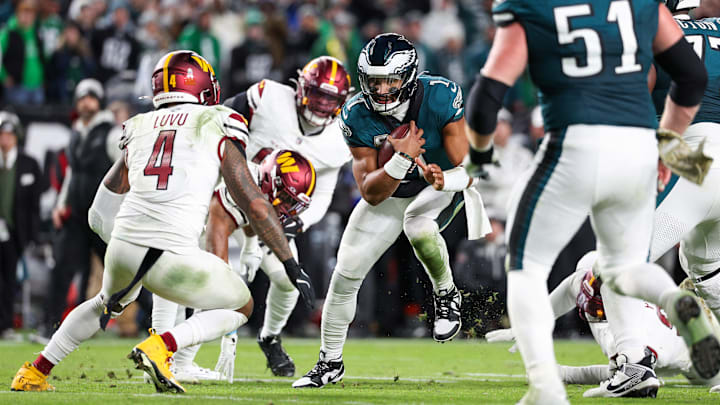The Philadelphia Eagles made the 'tush push' a household name. The play entails a player (typically the quarterback) lining up in a QB sneak formation but with skill position players like the running back and wide receivers set up behind him so that when the ball is snapped, they can push him into the endzone or across the line to gain. As fans of other teams know all too well, the play is nearly impossible to defend.
One team in particular, the Washington Commanders, tried some unconventional tactics in their unsuccessful bid to stop the play during last season's NFC Championship Game. Linebacker Frankie Luvu attempted to time his jumps over the Eagles offensive line to stop the snap from reaching the quarterback.
Good Morning to Tush Push fans & Tush Push fans only. Never forget the longest one 🍑 pic.twitter.com/ZIQu4TbNJ5
— Philadelphia Eagles (@Eagles) April 11, 2025
Now that the NFL is considering banning the play altogether, Luvu is weighing in on the debate.
“I think they should ban it.”
— Kyle Brandt (@KyleBrandt) May 19, 2025
-Commanders linebacker and Tush Push legend Frankie Luvu pic.twitter.com/abfL7CJPeV
"I think they should ban it," he told Good Morning Football's Kyle Brandt on Monday. "I know the argument is going to be about, 'Hey, you guys have to stop it, don't get us in short yardage situations and whatnot,' ... it's kind of like a cheat code play."
Commanders' Frankie Luvu just gave Eagles more reason to keep calling Tush Push play
Luvu likened having to face the Tush Push to a rugby scrum where the cadences of football are useless. But from a competitive point of view, he kind of just proved the Eagles' point of why it shouldn't be banned.
They figured out how confuse opposing defenses and throw them off the crutch of a cadence, plus they have the physical talent to execute the play to perfection. If a defense can't stop it, then you've cracked the code.
Now, it's fair to criticize the fact that the NFL banned any player being pushed or assisted by another over the line to gain or a the goal line prior to 2004, but for now it's legal and going back to that precedent would suggest the league made a mistake then. And the league doesn't like to admit it makes mistakes.
The league will make a decision on the controversial play later this year after tabling the vote at the most recent owners meeting in April.
